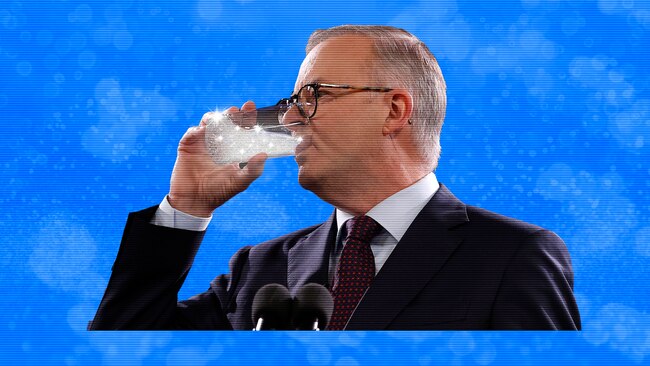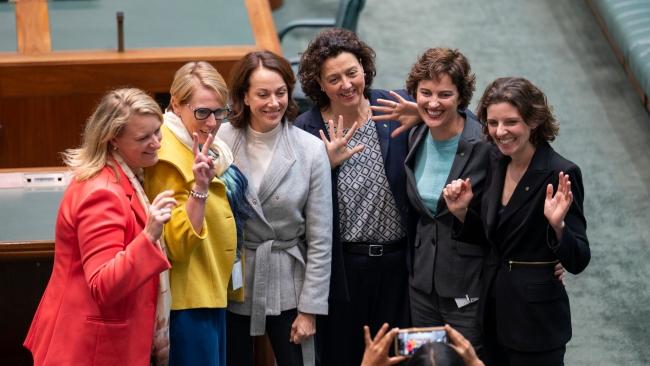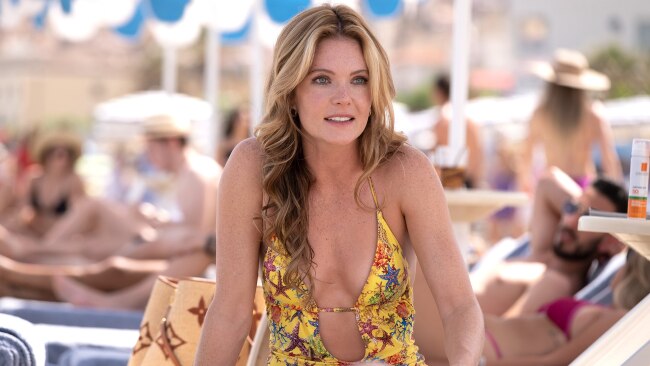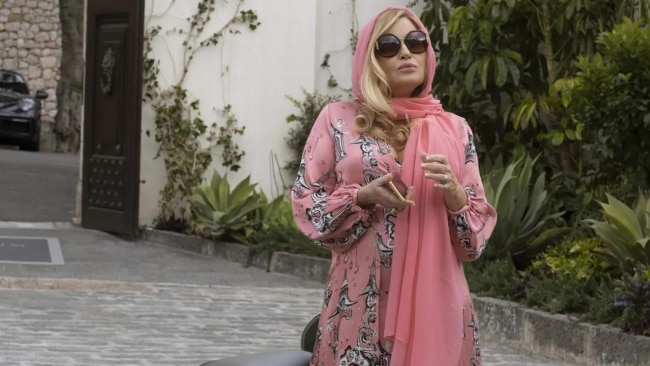The new parliament is a tall drink of water
A record number of women, more diversity than ever before and babies everywhere. The 47th parliament of Australia is incredibly refreshing.

A record number of women, more diversity than ever before and babies everywhere. The 47th parliament of Australia is incredibly refreshing.
This is an opinion piece.
Colourful suits, a full creche, a teary prime minister, and smiles that could solve the energy crisis. Our new federal parliament feels like it was cast for a new Baz Luhrmann movie.
Zest and energy infused the hallways, Aussie's Cafe and the chambers in Canberra as the 47th parliament was officially opened and a new government - the first in about a decade - took their seats and swore to serve us.
It was like the usually stuffy Parliament House got a good airing out.
Lower house MPs - the ones who sit in the House of Representatives (the green room) - took the oath on a range of texts, from Bibles and Torahs to Qurans and Buddhist texts.
"Don’t miss the chance. Because you’re not here for that long. None of us will be. And when you’re sitting on the porch thinking about what you did, you can either have a source of pride or a source of regret. No middle path. No middle path. Make it a source of pride,” an emotional Prime Minister Anthony Albanese said to rapturous, and most importantly, bipartisan applause.
For the first time in our political history, there is a record number of Carla Zampatti dresses, as opposed to the once prevalent MJ Bale suits, in both houses of parliament.
The federal election was a win, not just for the Greens and the teal new wave, but also for a new world order of sorts.
There is a new guard looming. One that is all about difference, diversity and diverging from a place of “that’s just the way it is” to a new chapter in Canberra that champions equality and equity.
Climate change was front of mind for many voters who backed Independents including Allegra Spender – daughter of the late Zampatti – in the seat of Wentworth and Kate Chaney - grand daughter of a former federal Liberal minister - in Curtin, to speak up for the environment.
This is in keeping with what ANU climate scientist Joelle Gergis so aptly sums up in her new book, Humanity’s Moment: A Climate Scientist’s Case for Hope, which comes out next week: “What an extraordinary time to be alive; we are part of the generation that will help heal the world.”
Being in Canberra this week just feels like there's an age of societal sustainability upon us.
The new class is one of the most representative parliaments we’ve had thanks to a new government and a collection of MPs who accurately represent modern Australia.
A record number of women have now taken their seats in the House of Representatives.
Many are not aligned to the traditional parties and make up the supersized crossbench.

Women count for 51% of the Australian population and now comprise 38% of the lower house chamber in the new parliament – the highest ever proportion on record – after 58 women were elected to House of Representatives, including 19 debutante MPs.
This is our highest proportion of women ever in the lower house.
The eight independent MPs - all women - were welcomed together.
As debate opened on legislating for a 43% reduction in emissions, 10-days of paid domestic violence leave and more nurses being installed into aged care homes - a bunch of new ministers got their chance to speak and shine.
Including new aged care minister Anika Wells, who is not short on experience, having worked in the sector prior to entering politics in 2019, or sass.
We on this side of the house actually follow the medical advice. Where are your masks? #auspoll pic.twitter.com/8l0XKN78P1
— Anika Wells MP (@AnikaWells) July 27, 2022
History was made when new Lingiari MP Marion Scrymgour from the NT asked the minister for Indigenous Australians, Linda Burney, a question during question time.
Marion Scrymgour and @LindaBurneyMP made history today in Parliament, with the first ever question and answer between First Nations women. pic.twitter.com/JWg3wMyVot
— Anthony Albanese (@AlboMP) July 28, 2022
"History is calling us all," Burney said when replying to the Q about what the government is doing about implementing the Uluru Statement from The Heart.
The Senate - the upper house or the red room - reached and exceeded 50% gender parity in the last parliament, and maintains it this time around.
Senator Pauline Hanson got offended when the new President - Labor's Sue Lines - was conducting the acknowledgment to country so stormed out of the chamber because she considers the (newish) tradition “divisive and disenfranchising”.
Acknowledgement to country has been a part of the Senate opening every sitting day in Parliament House since 2010.
Hanson was elected (again) in 2016.
Shortly after she left in a strop, she was canvassing for her supporters opinions.
"I have expressed concerns with so called "welcome to country" ceremonies as I believe they spread racial division in Australia... I also want to know what you think so please take the time to answer this short survey," a One Nation newsletter said before asking for donations.
No one in the chamber acknowledged Hanson's opinion on the acknowledgement as all eyes were on the debutantes.
Now almost 10% of the Senate identifies as Indigenous after the record number of Aboriginal and Torres Strait Islander representatives elected, including four new Indigenous MPs, three of whom are women.
Who all have differing experiences and opinions.
The first sitting week ended with the first speeches by our new Aboriginal female MPs who were blistering in their assessments of the state of the nation, the state of politics and society at large.
They have vowed to unite and demand that we tackle domestic violence and alcoholism ravaging Indigenous communities, with Scrymgour likening the recent removal of grog bans to “pulling forces out of Afghanistan”.
While Coalition senator Jacinta Price and ALP Victorian senator Jana Stewart all spoke during the day dominated by the government’s push to abolish the cashless debit card.
Price, who was accompanied by her great-aunt Tess Napaljarri Ross, dedicated her maiden speech to the murder-suicide last week of a Territory woman and her baby allegedly by the woman's male partner.
Stewart is the youngest Indigenous woman to serve in parliament.
She is committing her term to making changes on issues that affect First Nations people, even if it made others uncomfortable.
“I don’t care about your discomfort,” Stewart, who is 35-weeks pregnant, said.
Casually taking my seat in the Senate today at 35 weeks pregnant ðŸ’ðŸ½â€â™€ï¸
— Senator Jana Stewart (@JanaStewartVIC) July 25, 2022
An important message to all women that you belong in Parliament, and in all places where big decisions are made, no matter what stage of life you’re in.#AusPol #AusPol2022 pic.twitter.com/djLVqgbuuI
“It’s uncomfortable to read child death reports … One woman dies every nine days in this country, that’s uncomfortable. I and other parents of colour have to teach children the alphabet at the same time as how to deal with racism.”
Fatima Payman, from WA, also stole the show in the Senate by making history as Australia’s first hijab-wearing Muslim senator.
“I want young girls who decide to wear the hijab to do with pride“
— TRT World (@trtworld) July 28, 2022
Fatima Payman, who has made history by becoming Australia’s first hijab-wearing Muslim senator delivered her first speech in parliament pic.twitter.com/kRMq07U3tP
There's still some work to be done but we've come a long way since our first female politician, Edith Cowan, was elected to the WA Parliament in 1921.
Her colleagues were so opposed to her being there, she had to make two attempts at presenting her first speech, because the men kept interjecting as she spoke of wanting equal access to education for young Australian women.
That access was granted and is one of Cowan's legacies with a university now bearing her name.
It was thanks to Cowan's "nevertheless, she persisted" attitude that more than a century later Sally Sitou could earn her PhD after her parents fled war torn Laos during the Vietnam War and then take her seat inside Australia's most important house.
Her plan?
To continue Cowan's vibe and pay it forward.


